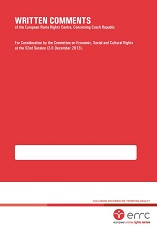WRITTEN COMMENTS BY THE EUROPEAN ROMA RIGHTS CENTRE (ERRC submission to the European Commission on the enlargement component of the EU Roma Framework May 2017)
WRITTEN COMMENTS BY THE EUROPEAN ROMA RIGHTS CENTRE (ERRC submission to the European Commission on the enlargement component of the EU Roma Framework May 2017)
Author(s): Author Not Specified
Subject(s): Gender Studies, Education, Geography, Regional studies, International Law, Human Rights and Humanitarian Law, Welfare systems, Social differentiation, Studies in violence and power, Health and medicine and law, EU-Approach / EU-Accession / EU-Development, EU-Legislation
Published by: European Roma Rights Center
Keywords: EU; EU enlargement; human rights; Roma; state care; education; discrimination; gender equality; housing; racial profiling; violence; Albania; Kosovo; Macedonia; Serbia; Turkey;
Summary/Abstract: The report commissioned by DG NEAR The Thematic Evaluation on IPA Support to Roma Communities, clearly identified why EU funding did not have a discernible impact on Roma inclusion in the first round of IPA assistance. The findings from the first round of IPA funding raised a number of concerns: - Credible assessment of project effectiveness proved to be difficult “because of poor design of indicators and means of verification, together with scarce project level evaluation”; - Even in the sphere of education where most progress has been made the report concluded that “Evidence for improved educational attainment is piecemeal and anecdotal – but points strongly in the right direction”; - Displacement projects were not designed specifically for Roma, but for all displaced persons so there were no Roma-specific activities, objectives or indicators. Specifically for the Roma population, sustainability is highly questionable and there are concerns that housing projects creating (or re-creating) segregated communities. - Housing projects are expensive and relatively insignificant interventions compared to the scale of the needs. - Employment projects have not achieved any notable successes; - Monitoring at country, programme and project level remains very poor. At country level, there are some efforts to provide indicators and data on the situation of Roma communities, but there is an almost complete lack of comparable information over time to show changes. The recommendations concerning political will, financial allocations, robust monitoring, gender equity, and the “need for a strong, independent and sustainable civil society”, mirror the challenges facing the EU Framework. What is clear from ERRC’s various submissions, advocacy, research and litigation in the enlargement countries of the western Balkans over the past years is that for Roma inclusion to be effective, national and local authorities must prioritise combating all forms of discrimination; ending residential and school segregation; challenging ethnic profiling and police brutality; addressing statelessness and ending forced evictions; and ensuring access to justice. The need to step up the fight against all forms of discrimination against Roma including institutional racism, which is evident in the enlargement countries, is something that is common to all of the Member States of the European Union. The Commission in its 2016 Communication on the EU Roma Framework, explicitly called on Member States to demonstrate greater political will to combat discrimination, described rising anti-Gypsyism as “a specific form of racism”, and urged public authorities to distance themselves from racist and xenophobic discourse that targets Roma. When it comes to anti-Roma hate speech and hate crime, the Commission bluntly stated that authorities’ failure to take action effectively amounts to complicity: “it is important to realise that a reluctance to act also contributes to the acceptance of intolerance in societies.” The ERRC fully agrees with the Commission’s observations, and it is clear from this ERRC submission and the previous one, that Roma in enlargement countries face similar or even more serious problems than in many EU Member States. As mentioned earlier, the ERRC welcomes the Commission’s statement that enlargement policy remains focused on the “fundamentals first” principle, which includes the rule of law and fundamental rights, with specific mention of the “need to better protect minorities, in particular Roma.” Therefore, the ERRC recommends that the Commission work with the governments of enlargement countries to put in place “robust monitoring mechanisms” on Roma inclusion that align with the EU Framework, and to establish an annual reporting schedule that coincides with that of the Member States. This would allow for greater transparency and meaningful comparability between Member States and aspirant countries. It is important from the outset to send a signal to these countries that combating discrimination and racism is a priority for the Commission in its “fundamentals first” policy approach to further enlargement. Based on our common experience of the EU Framework, ERRC fully endorses the Commission’s assertion that “stepping up the fight against racism and discrimination” remains essential to making any advances in “reducing the socio-economic gap between the Roma and non-Roma population in the Western Balkans and Turkey” up to 2020 and beyond.
Series: Papers submitted to OHCR and related Commissions
- Page Count: 19
- Publication Year: 2017
- Language: English
- Content File-PDF

